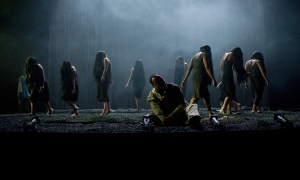The Oresteia
By Aeschylus
HOME, 28 October 2015

This powerful production uses Ted Hughes’ chiselled, perspicacious version of Aeschylus’ blood-shrouded trilogy.
He was an interesting fellow, this Aeschylus. An earlier play, Persae (472 BCE), presented a sympathetic portrait of the Persians, the Greeks’ great adversary in war; a foe against whom Aeschylus had fought some years earlier. In The Oresteia a lot of the action takes place in Argos, the Argives being a people both Egyptian and Greek. Danaus features in their foundation myth.
At the start, we have a society dealing with the aftermath of war. Troy has fallen and the warriors, triumphant and/or trauma-stricken, return home. Among them is Agamemnon, but what awaits him is not a triumphal procession but bloody death at the hands of his wife Clytemnestra. She no longer wants to know him. More violence follows. They aren’t kind of heart, those Furies.
We had a strong cast, led by Gary Shelford (Agamemnon) and Lyndsey Marshal (Clytemnestra), among whom Simon Trinder (Orestes) in particular caught the eye. What was special about this production, though, was that you became immersed in the drama from the very start. There was an immediacy; it was a matter of quality, not quanta. Right from the get-go, you were an involved witness in the unfolding tragedy, if not quite a member of the chorus.
While watching the drama unfold – and this was likely a consequence of Blanche McIntyre’s approach, whether intended or not, I don’t know – I thought of how local it all was. Reflecting back, it struck me that the action on stage undercut all the talk of justice at the end. These people were family, neighbours (as in Jedwabne in 1941), and the (village) violence arose from someone wanting more, just as it might come out of a petty squabble. Or occur as a matter of settling old scores, a grievance or insult that preys on the mind. War and tyranny created the opportunity for this violence to escalate. It is significant that the gods are the ones who at the close, from their exalted vantage point, come out with all this stuff about justice. Won’t ever happen in this world: revenge will always trump reconciliation.
Classics are always topical, almost by definition. The Oresteia is a classic but not an uplifting one. That’s because its theme, the problem of how we keep past violence in the past, is one we are hardly ever likely to solve.
The Oresteia is showing at HOME until 14 November, further details can be found here.
